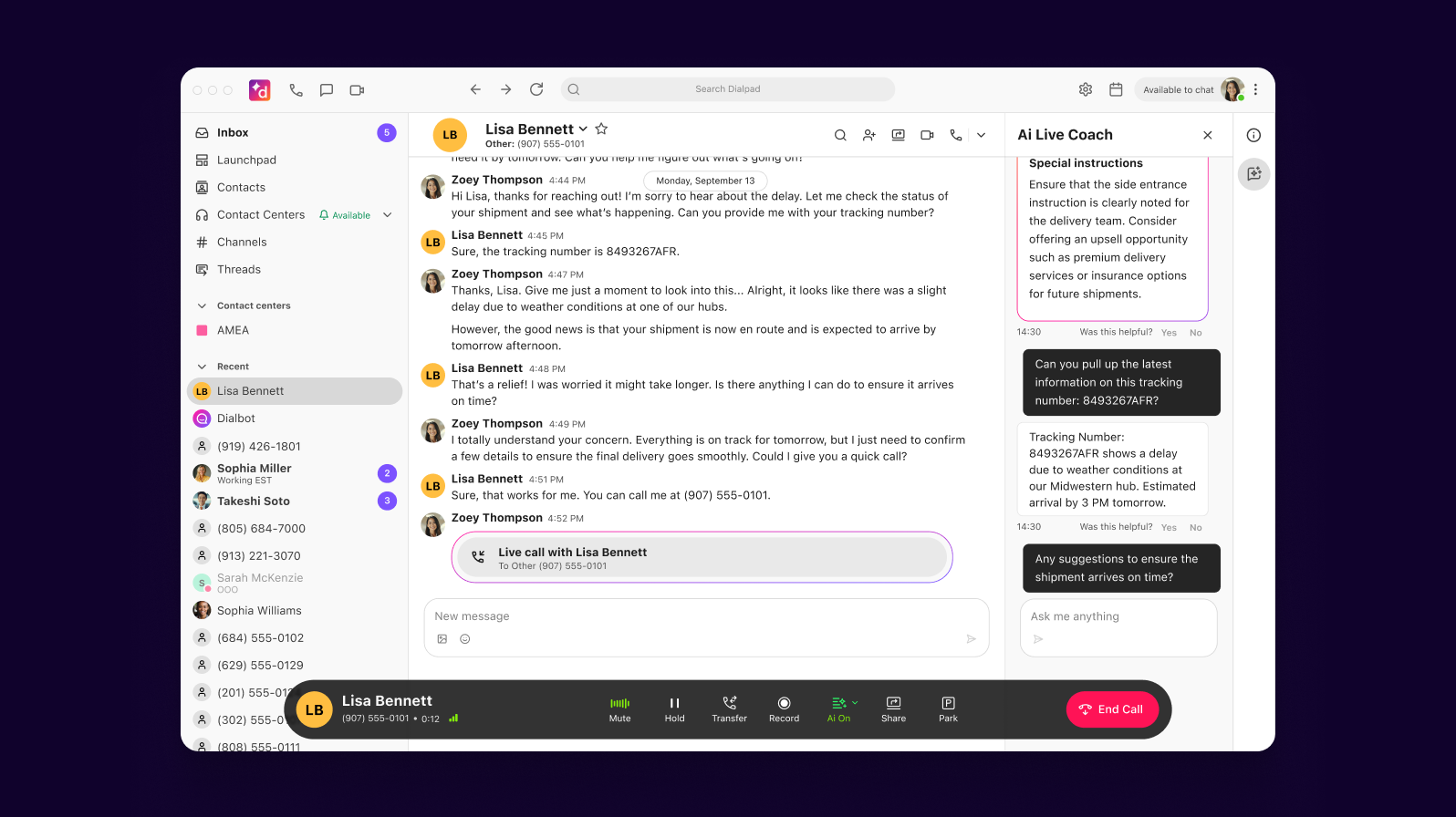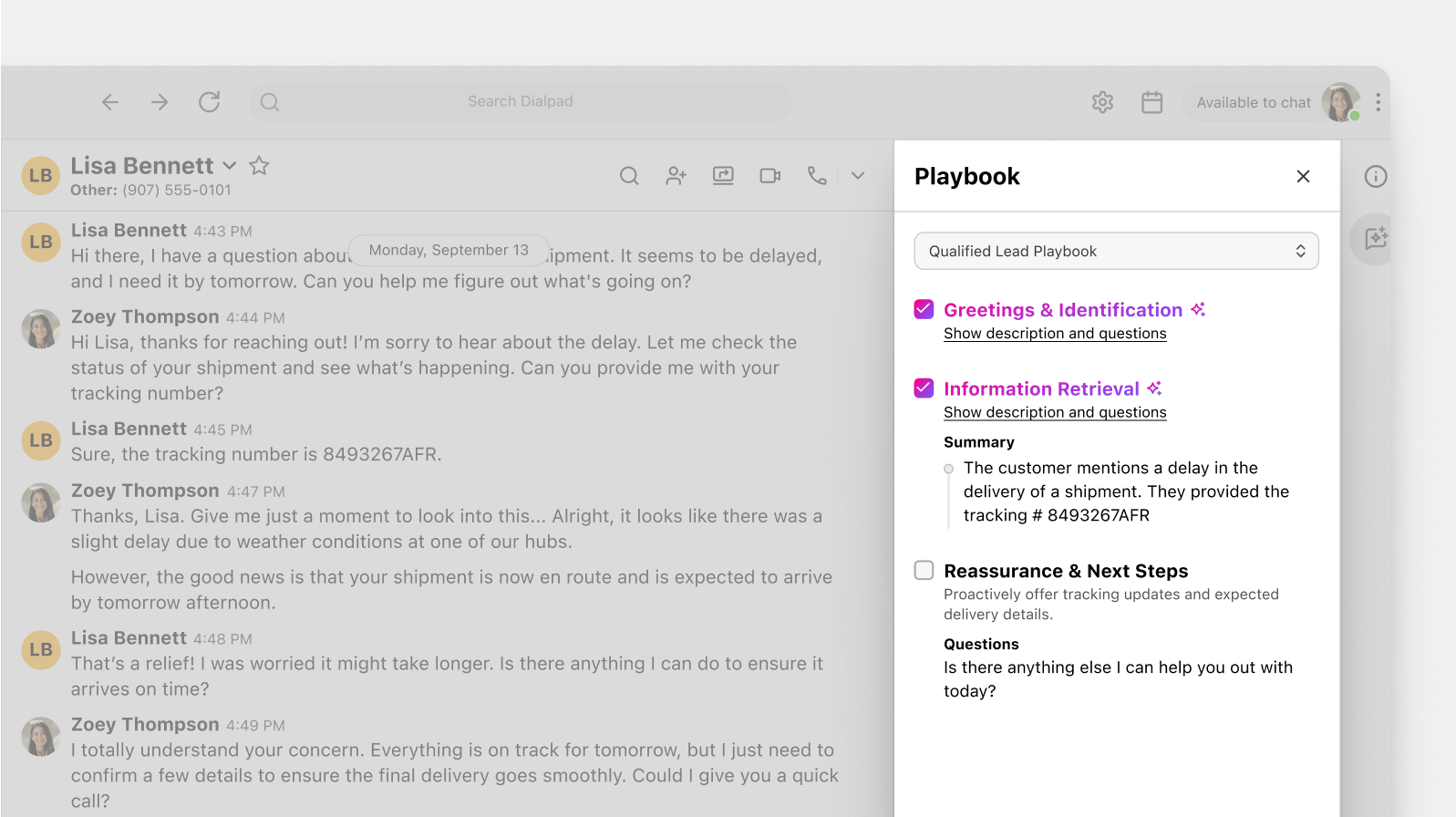What are AI virtual assistants and how can businesses benefit from them?

Sr. Product Marketing Manager

Tags
Share
If you've ever used Siri or Alexa, then you've already experienced the power of an AI virtual assistant.
But did you know that businesses across many industries—from healthcare and insurance to HR and IT—are increasingly relying on AI virtual assistants to drive efficiency, improve service delivery, and even close more sales?
In this blog post, we'll take a look at what AI virtual assistants are, how they work, and the benefits they offer businesses across different industries. We'll also take a behind-the-scenes look at the building blocks that make virtual assistants possible: conversational AI.
But first, let’s clarify what we mean by AI virtual assistants.
What is an AI virtual assistant?
An AI virtual assistant is a type of artificial intelligence (AI) tool that can understand and respond to human queries and requests—whether spoken or typed—and even perform advanced tasks like speech recognition and data analysis. AI in call centers and contact centers are becoming more commonly used to perform tasks such as answering customer questions, scheduling appointments, and providing general information.
They’re often powered by Natural Language Processing (NLP) and machine learning, which means they can understand and respond to complex questions far better than traditional rule-based chatbots.
For example, instead of only responding to exact keyword matches, an AI virtual assistant can recognize variations like:
“What’s your return policy?”
“Can I send something back if I don’t like it?”
“How do I get a refund?”
… And it can provide the right answer every time—even if the customer has a typo in the question.
This greatly differs from traditional chatbots, which rely on a human being painstakingly mapping out every conceivable customer question with a static answer.
Some AI agents can also integrate with other software like CRMs, calendars, and project management systems to complete more complex workflows like booking demos or pulling customer purchase history in real time.
Virtual AI assistants can be very helpful for businesses, since they can free up employees' time by taking care of simple tasks that don’t really require human interaction, and also help improve the customer experience by providing support around the clock, even when agents are offline.
Examples of different types of AI virtual assistants
There are different types of AI virtual assistants, each with their own unique set of features and capabilities. Here are some examples of the most popular types of virtual AI assistants:
1. Customer service AI virtual assistants
These virtual assistants can do two things to support your customer service strategy—firstly, they can deflect inquiries that customer service teams receive by providing instant answers to customers’ questions.
These AI customer service assistants can also surface relevant information and data to help customers self-service, like setting up a move or opening an account (learn more about AI self-service).
Some AI virtual assistants for customer service also work by helping the agent—there are solutions, like Dialpad AI Live Coach, that automatically pop up helpful information and connect agents to the most relevant content and materials at the right time:

Key capabilities:
Answer FAQs about returns, policies, and accounts
Guide customers through troubleshooting or setup steps
Integrate with CRMs and knowledge bases to pull real-time data
Support omnichannel messaging (like website chat, SMS, and WhatsApp)
Offer 24/7 availability for after-hours support
2. Sales AI virtual assistants
Similarly, this type of virtual assistant can do the same two things as customer service AI assistants.
You can set up a sales AI virtual assistant on your website’s checkout page to answer any questions that a customer might have before confirming their purchase (like shipping or delivery questions), and Dialpad even has an AI Playbooks feature that provides real-time pointers to help sales reps adhere to their team’s sales methodology, whether that’s BANT, SPICED, or a custom playbook:

Key capabilities:
Assist with product questions and pricing details during checkout
Handle lead qualification by asking targeted questions
Schedule demo calls or follow-ups
Surface real-time objection handling tips for reps
Auto-log conversations and update CRM records
3. Consumer AI virtual assistants
Finally, almost everyone has used this type of virtual AI assistant before. If you’ve ever asked Siri or Alexa to turn on the lights, or even what the weather was like today, you’ve already experienced what it’s like to use a consumer-focused AI virtual assistant.
Key capabilities:
Voice-enabled command execution (“Set a timer”)
General knowledge retrieval (like “What’s the weather today?”)
Smart home control (e.g., lights, thermostats)
Integration with apps for texting, calling, or reminders
The benefits of AI virtual assistants across industries
Today, some of the best AI virtual assistants are no longer limited to consumer technology or basic customer service—they're now embedded across nearly every industry, helping organizations work faster, smarter, and more efficiently.
From automating patient intake in healthcare to streamlining claims in insurance, enterprise AI virtual assistants are transforming how work gets done in many vital ways. Let’s look at how AI virtual assistants are already driving value in key sectors.
AI virtual assistants in healthcare
In healthcare—where timing, accuracy, and patient experience are critical—AI virtual assistants are transforming both patient-facing and back-office operations. Here are a few examples:
Patient intake automation: Patients can submit symptoms, insurance information, and medical history through a virtual assistant before a visit or telehealth call, which reduces wait times and the administrative burden.
Triage and symptom checking: AI tools can analyze symptoms in real time and help prioritize urgent cases. They can even recommend whether the patient should visit a clinic, go to urgent care, or stay home.
Staff support: Nurses and physicians can use AI assistants to access treatment protocols, drug interaction data, or patient records mid-consultation, saving time and improving care delivery.
Example use case:
A hospital group uses a virtual assistant on their patient portal and mobile app to screen flu or COVID-19 symptoms, recommend next steps, and route high-risk patients to immediate care. Nurses use the same system internally to access recent lab results or look up dosage guidelines. (In fact, AI bots were used to help screen users for coronavirus infection during the height of the COVID-19 pandemic, with a high degree of success.)
AI virtual assistants in insurance
In the insurance industry, customers may have very urgent and/or complex questions, which the insurance contact center’s agents need to answer quickly. Often, they’ll need to be able to quickly find highly nuanced or specific answers to answer questions around policies and regulations.
This makes insurance an ideal testing ground for AI automation, with potential benefits in areas like:
Customer-facing support: AI assistants can handle quote requests, policy comparisons, renewal questions, and claims status inquiries automatically—24/7.
Agent augmentation: Agents can ask the assistant things like “What is the grace period for policy X?” and get an instant answer pulled from hundreds of internal documents.
Claims automation: AI tools can walk customers through the process of filing a claim, verifying documentation, and even providing real-time claim estimates.
Example use case:
An insurance provider integrates an AI assistant into its website and mobile app. A customer wants to report a minor auto accident—rather than having to wait on hold, the assistant collects the details, checks coverage, guides the customer through photo uploads, and even estimates the deductible—all within minutes.
💡 Further reading:
Learn more about AI use cases in insurance.
AI virtual assistants in utilities
But what about something like utilities? There are many different ways in which AI virtual assistants can improve processes for both customers and agents too.
Let’s say you walk into your house and smell gas—this is potentially dangerous and requires immediate attention. If your utility provider had an AI virtual assistant, you’d be able to go to their website or another messaging channel like WhatsApp, and quickly enter your address and billing information (so that the system knows who you are) and let the AI virtual assistant know what the issue is.
(The AI assistant would likely tell you to leave your home immediately before escalating the issue to call the fire department or emergency services in the case of an actual gas leak.)
A few ways AI virtual assistants can help utilities providers:
Emergency triage: AI assistants can provide immediate instructions (for example, “Evacuate now”) and escalate to emergency services.
Billing and usage inquiries: Customers can ask about billing cycles, payment plans, or recent energy usage and receive personalized, real-time answers.
Field technician support: Field workers can access manuals, diagrams, or troubleshooting flows hands-free through a mobile iI assistant during on-site visits.
Example use case:
A utility company deploys a web-based assistant that allows customers to report outages, pay bills, or troubleshoot minor issues. In emergencies, it collects key info (like address or reported smell of gas), confirms identity, and notifies the right responders.
AI virtual assistants in IT
In offices, employees frequently run into IT-related issues that can disrupt productivity—from forgotten passwords and software glitches to access requests and connectivity problems. These issues can quickly overwhelm IT teams, especially in larger organizations with distributed teams and hybrid work setups. AI can be a powerful timesaver by helping with:
First-line troubleshooting: AI assistants can walk employees through simple solutions for common issues like printer errors, VPN problems, or video call setup—without involving human IT staff.
Automated password resets and access requests: Virtual assistants can authenticate users and initiate system actions like resetting passwords or granting permissions through integration with identity management tools.
Help desk ticket triage: Instead of waiting for manual categorization, AI assistants can assess incoming requests, prioritize them, and route them to the right IT specialist.
Example use case:
An employee messages the IT AI assistant in a group chat: “I can’t log into my email.” The assistant checks the employee’s email account status, walks the employee through the basic steps of updating their password, and escalates if needed. Meanwhile, it logs the interaction and creates a ticket with full context for the IT team.
AI virtual assistants in HR
The HR department plays a vital role in creating a smooth, supportive employee experience—but is often buried in routine administrative questions and manual processes.
With employees regularly asking about time off, payroll, benefits, and onboarding procedures, HR teams can become overloaded, especially during peak times like open enrollment or hiring season. This makes HR another high-impact area for AI automation, where virtual assistants can deliver big returns by handling tasks like:
Employee self-service: An AI virtual assistant can instantly respond to common HR inquiries like “How many PTO days do I have left?” or “When do benefits kick in?”—without requiring human intervention.
Onboarding support: New hires can interact with AI assistants to complete paperwork, understand company policies, and get answers to FAQs as they get settled.
Interview scheduling and reminders: Virtual assistants can coordinate calendars, send automated reminders, and reschedule meetings without relying on recruiters to manage every step manually.
Example use case:
A company integrates an AI recruiting assistant into its applicant tracking system and career page. When a candidate applies, the assistant immediately screens the resume for key qualifications and follows up with a message to schedule an interview based on the hiring manager’s availability. Throughout the process, the assistant answers questions like “What’s the salary range for this role?” or “When can I expect to hear back?”—freeing up the recruiter to focus on top candidates and final-round interviews.
Agentic AI for the contact center
Dialpad’s agentic AI provides autonomous agent assistance that resolves customer needs in real time across voice and digital channels, managing routine tasks like scheduling and order updates while seamlessly transferring full context to a human agent when needed.
AI virtual assistants: An essential tool for business efficiency
As customer-facing teams increasingly rely on AI virtual assistants to provide quick and accurate answers to common questions, it's important to understand how they work and what they're capable of.
AI virtual assistants are essential for busy customer-facing teams because not only can they provide answers to customers in an automated and instant way, they can also help deflect calls and messages away from overworked agents—while ultimately improving the overall customer experience.
So, what’s the best AI virtual assistant in your business? If you’re not already experimenting with options, you may be missing out on a valuable opportunity to improve both workflows and operations. See how a solution like Dialpad’s AI-powered contact center platform could work for your team!
See what Dialpad AI can do for your business
Book a walkthrough of Dialpad with our team, or take a self-guided interactive tour of the app first!
